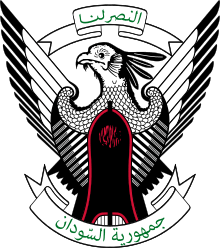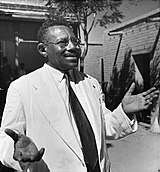1958 Sudanese parliamentary election
Parliamentary elections were held in Sudan on 27 February and 8 March 1958.[1] The first elections since independence in 1956, they were supposed to be held in August 1957, but were postponed by the ruling council, who claimed that flooding would affect the vote.[2] The result was a victory for the Umma Party, which won 63 of the 173 seats.
| ||||||||||||||||||||||
All 173 seats to the Parliament All 30 seats to the Senate | ||||||||||||||||||||||
|---|---|---|---|---|---|---|---|---|---|---|---|---|---|---|---|---|---|---|---|---|---|---|
| ||||||||||||||||||||||
| ||||||||||||||||||||||
 |
|---|
| This article is part of a series on the politics and government of Sudan |
|
|
|
|
Judiciary
|
|
Administrative divisions |
|
|
Related topics
|
The Southern Sudan Federal Party competed in the election, and won 40 of the 46 seats allocated to the southern provinces. The party platform represented a serious challenge to the authorities.[3] However, when it became clear that the party's demands for a federal structure would be ignored by the Constituent Assembly, on 16 June 1958 the southern MPs left parliament.[4]
Results
Parliament
| Party | Votes | % | Seats | +/- | |
|---|---|---|---|---|---|
| Umma Party | 63 | +41 | |||
| National Unionist Party | 45 | −6 | |||
| Southern Sudan Federal Party | 38 | New | |||
| People's Democratic Party | 27 | New | |||
| Total | 173 | +76 | |||
| Registered voters/turnout | 1,582,909 | 77.0 | − | − | |
| Source: Nohlen et al. | |||||
Senate
| Party | Votes | % | Seats | ||||
|---|---|---|---|---|---|---|---|
| Indirectly-elected | Nominated | Total | +/- | ||||
| Umma Party | 14 | 7 | 21 | +13 | |||
| National Unionist Party | 5 | 5 | 10 | −21 | |||
| People's Democratic Party | 4 | 5 | 9 | New | |||
| Federal Bloc (Southern) | 7 | 3 | 10 | +4 | |||
| Total | 30 | 20 | 50 | 0 | |||
| Source: Sternberger et al.[5] | |||||||
References
- Nohlen, D, Krennerich, M & Thibaut, B (1999) Elections in Africa: A data handbook, p851 ISBN 0-19-829645-2
- Elections in Sudan Embassy of Sudan in South Africa
- Viva Ona Bartkus (1999). The dynamic of secession. Cambridge University Press. p. 136. ISBN 0-521-65970-1.
- Gabriel Warburg (1978). Islam, nationalism and communism in a traditional society: the case of Sudan. Routledge. p. 105. ISBN 0-7146-3080-2.
- Dolf Sternberger, Bernhard Vogel, Dieter Nohlen & Klaus Landfried (1978) Die Wahl der Parlamente: Band II: Afrika, Zweiter Halbband, p1986

